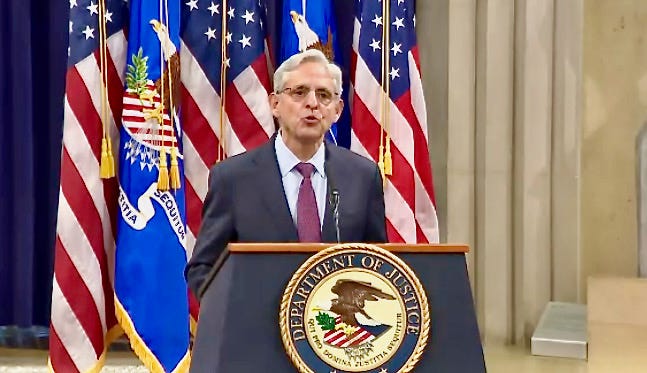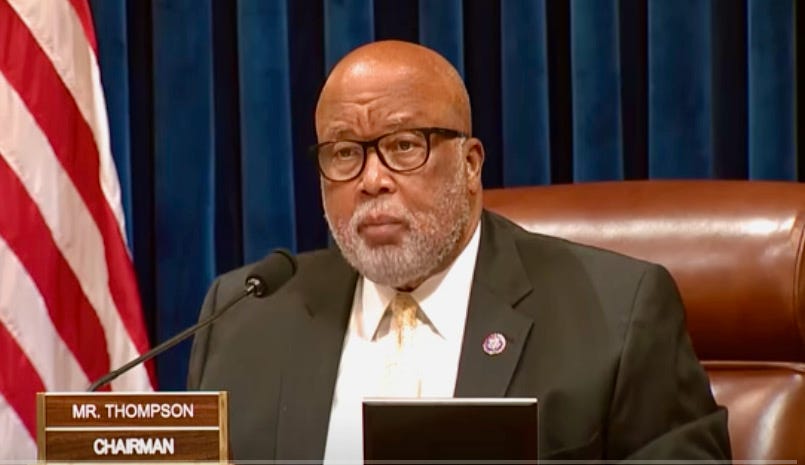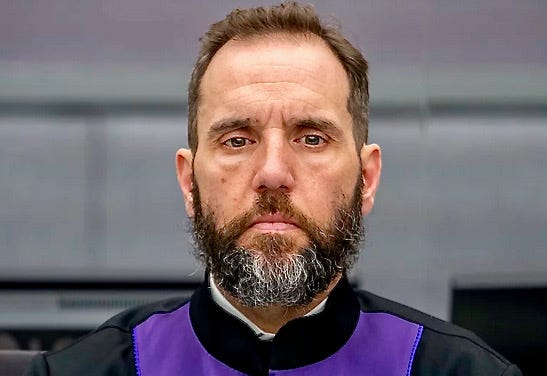INSURRECTION: Jan 6 panel makes history with criminal referrals
Irrefutable evidence of Trump crimes pressures DOJ to act
The criminal referrals of defeated ex-President Donald Trump and others by the House Select Committee to Investigate the January 6th attack on the US Capitol are a milestone of major significance in American history.
At its final hearing, the House panel voted unanimously that the 45th president should be prosecuted on four specific violations of federal law.
The blockbuster summary report of the Committee is far more than a work of huge historical significance.
It’s also a detailed roadmap for prosecutors at the Department of Justice to prepare one or more indictments of the 45th president who conspired with an unsavory group to illegally overturn the legitimate results of an election he lost.
The evidence is clear and irrefutable. A massive conspiracy led and coordinated by Trump tried – and almost succeeded – to thwart the will of the American voters.
It’s the textbook definition of a coup.
The perpetrators – all of them – must be held accountable. If they are not brought to justice, they’ll be emboldened to try again.
It’s a clear and present danger to the American experiment with representative government.

Of the four charges referred for prosecution, the Insurrection count is the most serious threat to Trump.
If he’s convicted, he would be barred forever from holding any public office under the 14th Amendment to the Constitution.
Committee Vice Chair Rep. Liz Cheney got right to the point at the start of the panel’s final public hearing on Dec. 19.
“Every president in our history has defended this orderly transfer of authority, except one,” Cheney said.
Later she added the obvious conclusion: “No man who would behave that way at that moment can ever serve in any position of authority in our nation again. He’s unfit for office.”
Action widely anticipated
The four criminal referrals come as no surprise to anyone who has been watching the committees’ work over recent months.
They were publicly hinted at more than once by both the Chairman Bennie Thompson and Vice Chairman Cheney.
In particular, at its public hearing in October the committee voted unanimously to subpoena the former president. Though he never did testify, he was clearly the principal target.
In her opening statement at that hearing, Cheney could not have been more clear:
“President Trump had a premeditated plan to declare that the election was fraudulent and stolen before election day, before he knew the election results,” she said.
“[He] made the conscious choice to preach, fraudulently, that the election was stolen, to pressure state officials to change election results, to manufacture fake electoral slates, to attempt to corrupt our Department of Justice, to summon tens of thousands of supporters to Washington, knowing they were angry and knowing some were armed, to send them to the Capitol.”
From the start, Cheney was laser-focused on the issue of intent, the one most difficult for prosecutors to prove. The evidence presented over the following two hours in October drove home the point repeatedly.
Cheney came back to this topic in her closing statement, in proposing a resolution to subpoena Trump to testify under oath:
“This is a question about accountability to the American people,” she said. “He must be accountable. He is required to answer for his actions.”
The clear implication was not only that Trump should testify to the Select Committee, but that he should be “held accountable” in a court of law.
Cheney had wrapped the case neatly without ever directly mentioning its obvious implications – crimes had been committed and those involved must be prosecuted.
It was a neatly drawn circle and Cheney was the ‘Chief Prosecutor.’
But she was not the only one to refer to crimes being committed.
In a video clip played during the same hearing, House Speaker Nancy Pelosi made the same point: “They’re breaking the law in many different ways,” Pelosi says. “And quite frankly, much of it at the instigation of the president of the United States.”

Wrapping up the proceedings, Chairman Bennie Thompson made a similar point.
“The committee needs to do everything in our power to tell the most complete story possible and present recommendations to help ensure nothing like Jan. 6 ever happens again,” he said. “But the need for this committee to hear from Donald Trump goes beyond our fact-finding. He is required to answer for his actions.”
Thompson’s meaning was implicit if not explicit: The evidence of crimes means Trump must be prosecuted in a court of law.
From the very beginning of the first Select Committee hearing in June, the panel was clearly targeting a criminal case against the ex-president.
Early on in the first hearing, Cheney cited specific sections of the criminal code in her opening remarks, as I detailed in my account
Inciting an insurrection remains the most serious charge.
Now it is up to Attorney General Merrick Garland to decide exactly how the ex-president will be held accountable.
It’s not as if Garland has to start from scratch. The House Select Committee has delivered voluminous evidence for him to use.
In addition, since at least spring the DOJ has had a secret criminal Grand Jury working in parallel to the Select Committee.
DOJ remains tightlipped about it, as it is required to do under federal law. But we have learned some of what is going on behind the scenes through intrepid reporting.
Recently, CNN revealed a major development in the proceedings in its scoop Trump's secret court fight to stop grand jury from getting information from his inner circle
“Former President Donald Trump’s attorneys are fighting a secret court battle to block a federal grand jury from gathering information from an expanding circle of close Trump aides about his efforts to overturn the 2020 election,” CNN reported.
It’s clear from this and the November appointment of Special Counsel Jack Smith that the DOJ investigation of the ex-president’s role in the insurrection is fully engaged. Dozens of subpoenas have been issued to Trump’s inner circle and many of them have already appeared before the criminal grand jury.
The supporting evidence from the House Select Committee just adds urgency and potency to the criminal case. What charges the DOJ finally decides to bring in an indictment remain unclear, but seditious conspiracy is a distinct possibility. It carries a 20-year prison term.
But this is not the only criminal case the DOJ has in progress against the ex-president. There is another even more serious and urgent case in the works.
On August 8, FBI agents arrived at Trump’s Florida home with a search warrant and left seven hours later with 11,000 documents, including over 100 top secret, classified items.
No one would have known about it had not Trump himself started ranting on his Twitter clone Truth Social that the FBI had "ransacked" his house. His allies in Congress immediately took to the airwaves and blasted Attorney General Merrick Garland and the FBI.
Three days later, the attorney general was forced to make a rare public statement about the matter. This is extraordinary; the DOJ never announces investigations in this way.
In a news briefing at the Justice Department Garland said:
“Just now, the Justice Department has filed a motion in the Southern District of Florida to unseal a search warrant and property receipt relating to a court-approved search that the FBI conducted earlier this week.
“That search was of premises located in Florida belonging to the former President. The Department did not make any public statements on the day of the search. The former President publicly confirmed the search that evening, as is his right.
“The search warrant was authorized by a federal court upon the required finding of probable cause.”
As is routine, the feds had to show a judge there was a distinct possibility crimes had been committed in order to get the warrant.
The crimes DOJ specified were shocking: they included a violation of the Espionage Act and obstruction of justice. None require possession of “Top Secret” documents.
As has been his practice for decades, the ex-president mounted a legal battle to delay, deflect and distract the public from the real issues of his criminal liability.
After struggling to assemble a team of lawyers, 10 days later he filed a motion before a hand-picked judge to request an independent review of all the documents before the DOJ could investigate them.
Suddenly the obscure legal term "special master" became a topic of national conversation.
Trump won the first round when District Judge Aileen Cannon allowed a Special Master to intervene and temporarily delay the investigation.
But her decision was immediately challenged by the DOJ in the 11th Circuit Court of Appeals.
With extraordinary speed, a three-judge panel of the Appeals Court ruled on Sept. 21 that the Justice Department was entitled to review the classified documents seized from Trump’s property. Ironically, two of the three judges were appointed by the ex-president. Trump’s appeal to the Supreme Court was summarily dismissed on Oct. 13.
The DOJ filed another appeal Oct. 14 seeking to block the entire Special Master intervention.
The Court of Appeals gave the DOJ a huge victory in November, ruling that Judge Cannon should never have appointed a Special Master and tossing out her entire proceeding. Days later, she vacated her ruling.
Just a few days prior, AG Garland had announced the appointment of Special Counsel Jack Smith to oversee both investigations: the espionage case and the investigation into crimes related to the January 6 insurrection.
Legal experts have been having a field day with the case regarding the theft of Top Secret documents. Many have said it is a better way for Garland to get to a quick indictment of the former president than the January 6 insurrection case.
First, it is relatively uncomplicated. The ex-president was repeatedly asked formally and informally to return government documents to the National Archives where they belong. He did not comply.
Suspecting that the documents included top-secret material, and that the ex-president was not fully complying with its subpoenas, the DOJ was forced to get a search warrant and find out the truth for itself.
Turns out their suspicions were well founded. The evidence is clear, compelling and, basically, ready for the jury. DOJ lawyers need nothing more than to write up their indictment and file it with the court.
After his appointment, Special Counsel Smith has hit the ground running, filing subpoenas for many Trump allies involved in both cases and calling them to testify before the criminal grand juries.
Historical legacy assured
Whether the work of the House Select Committee will lead to the first criminal indictment of an ex-president in US history remains to be seen.
It’s more likely than ever now after its formal referral of four specific charges for the Justice Department to consider.
What is already indisputable is that it has accomplished its primary mission: It has established a broad, deep and comprehensive factual history of the events of January 6 – before, during and after – which will live in infamy.
Future historians will be able to use its voluminous evidence for several chapters in their accounts of contemporary American history.
It's a disturbing chapter but it must be told. That is the only way to avoid another insurrection in the future.







Most interesting Warren! Thank you.
Warren, I agree the committee did a great job. Cheney in fact, gave up her career as she knew her critique of Trump would cost her the congressional seat. Her father certainly wouldn't have done that! The DOJ is still a political office but I suspect a lot of young DOJ lawyers would love to take on Trump's prosecution and thereby make their careers. Happy New Year!